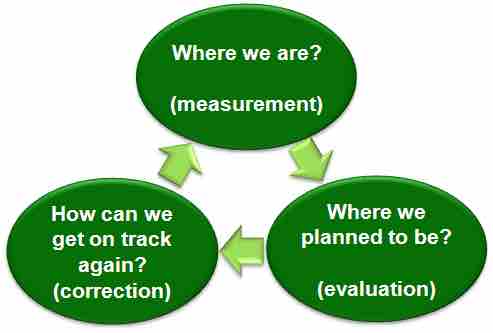Controlling is one of the primary theoretical managerial functions (alongside planning, organizing, staffing, and directing). Maintaining control is about identifying deviations from intended results and improving the process to achieve desired outcomes. According to modern concepts, control is a foreseeing action; an earlier concept of control identified it as chiefly detecting errors.
Control in management means setting standards, measuring actual performance, and taking corrective action. Control thus comprises three main questions: Where are we now? Where did we plan to be? How can we bridge the gap between the two? Control is inherently cyclical.

Monitoring and controlling project activities
These steps are involved in management control of project activities.
Robert J. Mockler on Control
Robert J. Mockler presented a more comprehensive definition of managerial control. He defined it as a systematic effort by business management to compare performance to predetermined standards, plans, or objectives to assess whether performance is in line with these standards and presumably to take any remedial action required. According to Mockler, the purpose of control is to ensure that human and other corporate resources are being used in the most effective and efficient way possible in achieving corporate objectives.
Relationship Between Planning and Controlling
Mockler's definition shows the close link between planning and controlling. Planning is a process which establishes an organization's objectives and the methods to achieve those objectives. Controlling is a process that measures and directs the actual performance against the planned goals of the organization. Thus, goals and objectives are often referred to as Siamese twins of management: managing and correcting performance to make sure that enterprise objectives and the goals designed to attain them are accomplished.
Application to Strategy
Control, relative to strategy, defines the latter stage of overall strategy. Once a company designs a strategic overview parallel with the corporate mission and vision, the implementation process requires control to ensure that strategy is appropriately communicated and executed. The direction of organizational control derives from the strategic plan of the organization. Control is an active process that evaluates current performance against this strategic backdrop to ascertain how closely the operations represent the desired functioning of the company.
Dissonance is often present between the way in which the company ideally wants to operate from a strategic perspective and the way it actually does. This is where control comes into play. Managers are tasked with ensuring that the organizational processes reflect the mission statement and vision as closely as possible, controlling aspects of the operations in pursuit of this goal. As a result, maintaining control is a constant responsibility that keeps the business as close as possible to its core strategies.